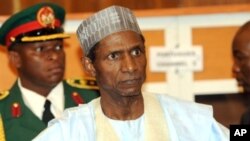It has been 42 days since Nigerian President Umaru Yar’Adua was rushed to Saudi Arabia with heart problems for medical treatment. In the wake of the attempted Christmas day bombing of an American airliner near the city of Detroit by a 23-year-old Umar Farouk Abdulmutallab, voices are being raised by critics and by the general public about Mr. Yar’Adua’s long absence.
From Washington, Nigerian-born human rights lawyer Emmanuel Ogebe explains that the apprehension surpasses the expected opportunism of political opponents.
“Even when you have a president in place in Nigeria, he has to work 24/7 to contain the infighting and intrigues that are around. When you have no president in place, the problem is just compounded. So there’s no doubt about it, that Nigeria is under virtual no-management at this point,” he said.
Attorney Ogebe says the anxieties of the past week following the attempted bombing stem more from Nigerians’ quest for reassurance and leadership following an uncharacteristic encounter with international terrorism.
“Whatever scenario planning analysis has been done about Nigeria, no one foresaw that we would actually be responsible for the first near-terrorist attempt in the United States after 9/11. Of course, all the intelligence and the signs have been there for the last decade or so that domestic terrorism and religious killings have been going on. But this is a new law for the nation to be responsible for jeopardizing the first African-American president’s tenure. I know this is not typical of Nigerians,” he observed.
Nigerians have widely criticized the repugnant behavior of Abdulmutallab, who comes from a prominent family and whose father, Alhaji Umaru Mutallab, is immediate past chairman of the First Bank of Nigeria. Many recognized the father’s courageous efforts to thwart terrorism by alerting U.S. officials about his son’s radical ties to Yemen. But many interviewed following the attack also appeared eager to underscore the point that Nigerians should not be viewed as terrorists. Emmanuel Ogebe says the public seems desperately in need of a spokesperson to repudiate the terrorist stigma.
“While Nigerians generally do not condone this sort of thing and will not participate in this type of thing, the President of Nigeria himself was a fundamentalist who implemented Sharia (Islamic law) in his state. So it is this type of extreme positioning that the politicians have done, whether for political reasons or elections or whatever, that has created the climate where some people will go to the fringe extreme,” he noted.
Mr. Ogebe says that in President Yar’Adua’s absence, Nigerian officials need to make a higher priority of finding a credible leader to address the public’s concerns about Abdulmutallab and the aspersions he has caused for Nigeria’s international image.
“We have in the United States Janet Napalitano, the Homeland Security Secretary, speaking. In the Netherlands, we have the Dutch Minister of the Interior, also a lady, speaking. In Nigeria, we have Professor Dora Akunyili, Minister for Information. And she is saying, ‘he only had 30 minutes in Nigeria,’ which doesn’t make sense, because for any international flight, you need to check in two hours before. So clearly, the information she is giving is not logical for anyone who travels internationally. And the Ghanaians seem to have it right. We really need to have a top intelligence official or someone from the presidency speaking on these issues,” said Ogebe.
He warns that the latest elevation of airline security alerts because of the Northwest Airlines bombing attempt are bound to have a ripple effect on Nigerians seeking visas to travel abroad and could stir international misgivings against Nigerians, who have rarely been identified with violence outside their country.
“Unfortunately, the nature of the world in which we are is that there will be a backlash against scores of well-meaning Nigerian businessmen and students and decent people, and this is something that hopefully we can overcome. But there’s no real leadership coming from the Nigerian side of the divide that is addressing this issue head-on,” said Ogebe.
